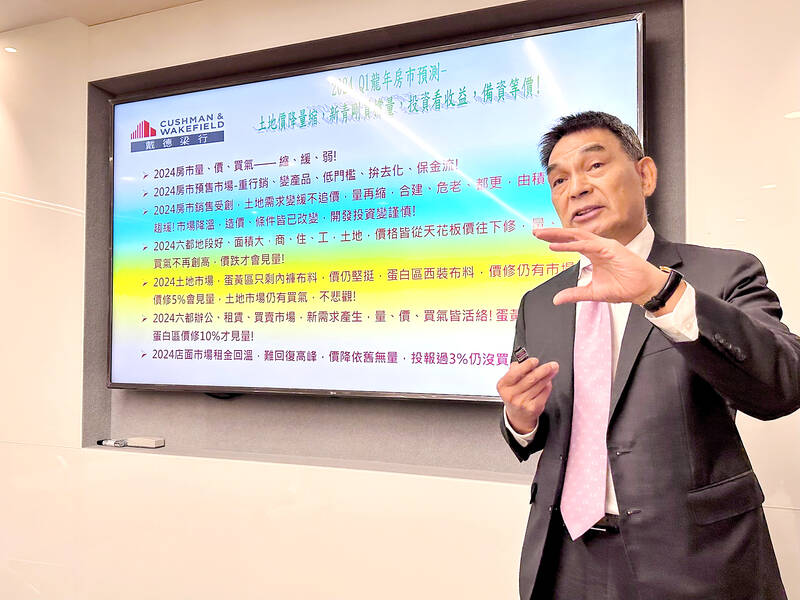Taiwan’s property market might face transaction and price corrections this year, with commercial and residential properties, as well as land affected, as soaring prices limit buying interest, Cushman & Wakefield Taiwan said yesterday.
“House prices per unit hit a record last year because developers rolled out small apartments to make them appear relatively affordable,” Cushman & Wakefield Taiwan managing director Billy Yen (顏炳立) told a news conference in Taipei.
The trend indicated that in addition to location and environment considerations, affordability is crucial to facilitate sales and further price hikes would drive away potential buyers, Yen said.

Photo: Hsu Yi-ping, Taipei Times
People who disagree could put houses they purchased in the past two years on the market and see if they can find buyers willing to pay similar prices, he said.
The buying spree induced by favorable lending terms for first-home purchases would prove transient this year in the absence of price concessions, he said.
Market players have sought to project a general sense of euphoria that runs counter to reality, he said, adding that transaction data last year support his observations.
Land deals last year plunged 34 percent from 2022 to NT$112.9 billion (US$3.64 billion), while commercial property transactions rose mildly to NT$130.19 billion, Cushman & Wakefield Taiwan said.
The small increase in commercial property trading had a lot to do with the liquidation of the Shin Kong No. 1 REIT fund (新光一號), which sold its six buildings in Taipei for a combined NT$30.7 billion, Cushman & Wakefield Taiwan valuation and advisory services head Charlie Yang (楊長達) said.
There are no REIT fund liquidity attempts on the horizon, which would weigh on transactions this year, Yang said.
It remains to be seen if domestic life insurers would rejoin the market after remaining on the sidelines last year due to stiffer yield requirements amid monetary tightening, he said.
That left self-occupancy needs from corporations to underpin the commercial property market, he said.
Another concern is that urban renewal projects and joint ventures could slow this year as developers turn cautious to cope with mounting construction costs and unfavorable investment terms, Yen said.
The market for land could fare better on the back of solid demand if sellers lower prices by 5 percent, he said.
Spiking prices for industrial plots of land last year put pressure on corporate profit, fueling caution on the part of prospective buyers, the company said.

SELL-OFF: Investors expect tariff-driven volatility as the local boarse reopens today, while analysts say government support and solid fundamentals would steady sentiment Local investors are bracing for a sharp market downturn today as the nation’s financial markets resume trading following a two-day closure for national holidays before the weekend, with sentiment rattled by US President Donald Trump’s sweeping tariff announcement. Trump’s unveiling of new “reciprocal tariffs” on Wednesday triggered a sell-off in global markets, with the FTSE Taiwan Index Futures — a benchmark for Taiwanese equities traded in Singapore — tumbling 9.2 percent over the past two sessions. Meanwhile, the American depositary receipts (ADRs) of Taiwan Semiconductor Manufacturing Co (TSMC, 台積電), the most heavily weighted stock on the TAIEX, plunged 13.8 percent in

A wave of stop-loss selling and panic selling hit Taiwan's stock market at its opening today, with the weighted index plunging 2,086 points — a drop of more than 9.7 percent — marking the largest intraday point and percentage loss on record. The index bottomed out at 19,212.02, while futures were locked limit-down, with more than 1,000 stocks hitting their daily drop limit. Three heavyweight stocks — Taiwan Semiconductor Manufacturing Co (TSMC, 台積電), Hon Hai Precision Industry Co (Foxconn, 鴻海精密) and MediaTek (聯發科) — hit their limit-down prices as soon as the market opened, falling to NT$848 (US$25.54), NT$138.5 and NT$1,295 respectively. TSMC's

ASML Holding NV, the sole producer of the most advanced machines used in semiconductor manufacturing, said geopolitical tensions are harming innovation a day after US President Donald Trump levied massive tariffs that promise to disrupt trade flows across the entire world. “Our industry has been built basically on the ability of people to work together, to innovate together,” ASML chief executive officer Christophe Fouquet said in a recorded message at a Thursday industry event in the Netherlands. Export controls and increasing geopolitical tensions challenge that collaboration, he said, without specifically addressing the new US tariffs. Tech executives in the EU, which is

In a small town in Paraguay, a showdown is brewing between traditional producers of yerba mate, a bitter herbal tea popular across South America, and miners of a shinier treasure: gold. A rush for the precious metal is pitting mate growers and indigenous groups against the expanding operations of small-scale miners who, until recently, were their neighbors, not nemeses. “They [the miners] have destroyed everything... The canals, springs, swamps,” said Vidal Britez, president of the Yerba Mate Producers’ Association of the town of Paso Yobai, about 210km east of capital Asuncion. “You can see the pollution from the dead fish.